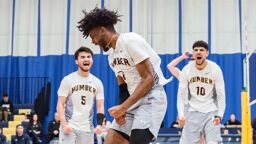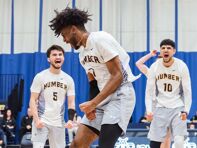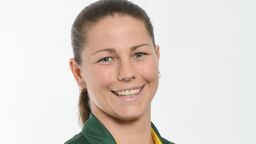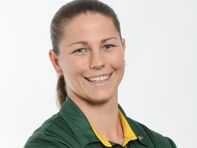When E Kerr took the mound as a high school pitcher in Massachusetts, most saw a fierce competitor with a seven-pitch arsenal. A shrewd, tough rightie whose pitching and hitting earned them a place in college softball.
No one knew the struggle stirring underneath where the athlete and the person collided.
“If had this awareness of my body and my identity back in high school, I don’t know if I would still be playing softball,” Kerr said. “It was hard for me to go to practice knowing I was going to be the wrong body and having to use that body to compete so well, even though I didn’t want to be in that body.”
Their identity came to light as a student-athlete at NCAA Division III University of Scranton (Pa.). Kerr made five appearances on the mound for the Royals in their freshman season in 2019, but softball seemed to come into conflict with the person they saw themselves to be.
Softball is classified as a women’s sport, but Kerr doesn’t classify themselves as a woman.
“I can’t really do a lot physically to make myself not feel dysphoria while playing the sport,” they said. “I started to go to practice and think I feel like I am suffocating in this uniform.”
In an interview in this week’s edition of the Trans Sporter Room, Kerr told their story at the intersection of sports and transness. It was also an example of how a locker room willing to learn can make a world of difference.

Throughout that freshman year, Kerr started their exploration of an identity as masculine-of-center.
“I started to bind, I started to cut my hair,” they said. “I wanted to dress strictly in men’s clothing. That’s what pointed me towards exploring my own gender.”
That exploration intensified through their sophomore year. Amid a cancelled season due to the coronavirus pandemic, Kerr came out as trans to then-head coach Mia Collarini Wascura.
What happened next set a positive course forward.
“We had someone from our women’s center come in to discussed gender and sexuality with our team,” they recalled. “That went so well that coach made us cancel practice to keep continuing that conversation on learning all the different identities and how it impacts daily life for people who identify as trans or as non-binary, and everyone was so intrigued by it. That was first big step in unifying us all.”
The team rallied around Kerr from that moment onward. In spring 2021, they made a single game appearance. Most of the season saw them healing from top surgery, and that led to a life-changing decision.
“I knew that once I started recovering that I wanted to keep going with this,” they noted. “I wanted to start hormones from the day I knew I wanted top surgery, I just trying to figure out when. I figured that it's now or it’s never. I was either going to do this now or keep pushing it off and keep putting myself through this mental pain that I couldn’t handle dealing with anymore.”
A trans male (FTM) student-athlete who has received a medical exception for treatment with testosterone for diagnosed Gender Identity Disorder or gender dysphoria and/or Transsexualism, for purposes of NCAA competition may compete on a men’s team, but is no longer eligible to compete on a women’s team — NCAA Inclusion of Transgender Student-Athletes
The NCAA regulations, now 10 years old, had been in the back of Kerr’s mind since they came to Scranton. For Kerr, hormone replacement therapy was a liberation that rated higher than any future start on the pitcher’s mound.
“I’ve always been the kind person who is a team player and I would rather see my team succeed even if never see a minute on the mound,” they answered. “Once I started to address the mental pain I was going through, I knew my team was going to do well and I just wanted to add to that process.”
Kerr is still a part of the softball program, but now as a team manager. They still prepared alongside the team as they opened their fall preseason camp, even if they aren’t playing in games. The team has a goal of regaining a conference championship, a title the program earned in Kerr’s freshman year.
Earlier this year, they participated in the Out In Sports study, measuring the experiences of LGBTQ athletes who have come out to teammates. While overall positive, high school and college trans athletes in the study shared higher levels of bad and negative experiences with teammates — 17.2% of those surveyed — than LGBTQ athletes as a whole — 4.6%. Still, 68.9% of trans athletes said they had a “good” or better experience being out on their teams, offering hope.
At Scranton, Kerr continues to make their mark on campus. In addition to pursuing a masters degree in occupational therapy, they are active in diversity efforts at the university to make the atmosphere for other LGBTQ students a better, safer place to be, learn, and to play ball.
“I want to leave a legacy on this program whether I’m playing or not,” Kerr noted. “I want upcoming athletes at my university to know that you can still be an athlete and be trans. They are not mutually exclusive.”
E Kerr delved deeper into their new role on their team, what solid support can look like, and they’ve even written a book using art and poetry to tell the story of their journey to date and future ahead. Catch the complete interview in this week’s edition of The Trans Sporter Room. Check it out on Megaphone, Spotify, Google Podcasts, Apple podcasts, and many other platforms for Outsports podcasts as well.







































